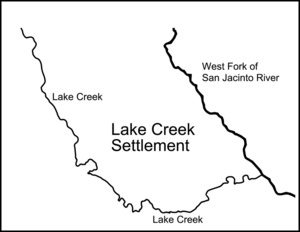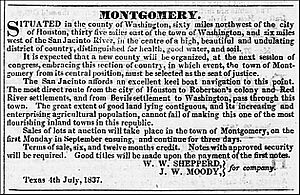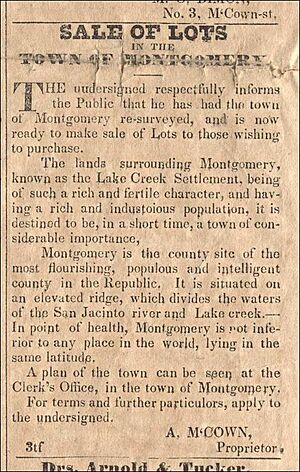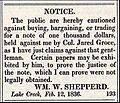Lake Creek Settlement facts for kids
The Lake Creek Settlement was an early community in what is now western Montgomery County, Texas. It existed from the 1830s to the 1840s. This settlement was part of Stephen F. Austin's Second Colony, first in Mexican Texas and later in the Republic of Texas. In July 1837, the town of Montgomery, Texas was started right in the middle of the Lake Creek Settlement.
Contents
How It Started
In 1821, Mexico won its independence from Spain. This created the new country of Mexico, which included Spanish Texas. Texas was not very populated, so it was joined with another area called Coahuila to form the state of Coahuila y Tejas.
The new Mexican government didn't have much money for its army. Settlers were allowed to form their own groups, called militias, to protect themselves from Native American tribes like the Apache and Comanche. To help with these raids, Mexico allowed settlers from the United States to move into Texas for the first time.
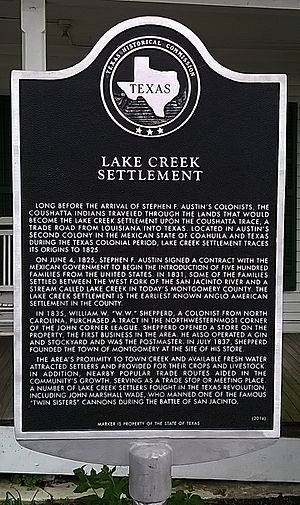
Stephen F. Austin was the first "Empresario" (a person who brought settlers to Texas) to successfully start a colony. The Mexican government gave empresarios land grants. They could then give land to settlers and give them official titles. Austin's first group of settlers, who received land between 1824 and 1828, were known as the Old Three Hundred. Farmers received about 177 acres, and those raising livestock received about 4,428 acres. They had to use the land within two years or lose it.
A new law in 1824 allowed any head of a household in Mexico to claim land. Immigrants had to be Roman Catholic and were expected to learn Spanish. They also needed to own property or have a useful job. Everyone wanting to live in Texas had to get permission from Mexican authorities.
The state government in Saltillo was in charge of approving settlement contracts for Texas. Many people, including land speculators, wanted to bring colonists. In 1825, Coahuila y Tejas put the federal law into action. At this time, about 3,500 people lived in Texas, mostly in San Antonio and La Bahia. Under the new law, people could claim a large amount of land. Soldiers got first choice, then citizens and immigrants.
Founding the Settlement
On May 20, 1825, Stephen F. Austin got a new contract from the Mexican state of Coahuila y Texas. He agreed to bring 500 families to Texas within six years. The boundaries of Austin's Second Colony were set on March 7, 1827. It stretched from the San Jacinto River west towards the road from Bexar to Nacogdoches.
Under this 1825 contract, Stephen F. Austin gave land to many colonists in 1831. Some of these settlers received large areas of land, called leagues (about 4,428.4 acres), in what is now western Montgomery County. Elias R. Wightman surveyed these lands.
Here are some of the early settlers who received land:
| Colonist - Date of Grant | Colonist - Date of Grant |
|---|---|
| Mary Corner - April 7, 1831 | William M. Rankin - April 10, 1831 |
| James Pevehouse - April 7, 1831 | Noah Griffith - April 11, 1831 |
| Archibald Hodge - April 8, 1831 | Benjamin Rigby - April 14, 1831 |
| James Hodge - April 8, 1831 | William Atkins - April 18, 1831 |
| Owen Shannon - April 8, 1831 | Jacob Shannon - April 30, 1831 |
| William C. Clark - April 10, 1831 | Raleigh Rogers - May 6, 1831 |
| William Landrum - April 10, 1831 | John Corner - May 10, 1831 |
| Zachariah Landrum - April 10, 1831 | Anne White - May 12, 1831 |
Within two years of these first settlers arriving in 1831, the area between the West Fork of the San Jacinto River and Lake Creek became known as the "Lake Creek Settlement." People also called it the "neighborhood of Lake Creek" or the "District of Lake Creek."
Growing the Community
After the first settlers received their land in 1831, more families moved to the Lake Creek Settlement. These included the Cartwright, Chatham, Galbraith, Garret, Mock, Shepperd, Springer, and Worsham families. For example, Thomas Chatham received a land grant in the settlement in 1834.
By 1835, the settlement had grown enough to need a trading post. William W. Shepperd bought 200 acres of land in the middle of the settlement. He opened a store there, which became known as "the store of W. W. Shepperd on Lake Creek." This store quickly became the main meeting place and community center for the Lake Creek Settlement. In the same year, John Bricker built a mill and a cotton gin for Shepperd at this location.
Texas Revolution
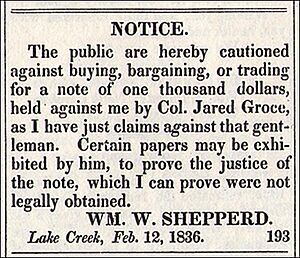
During the Texas Revolution, the Lake Creek Settlement was part of the Washington Municipality. Many people from the Lake Creek Settlement fought against Mexico in the revolution.
Some of the soldiers from the Lake Creek Settlement who fought in the Texas Revolution included Jacob H. Shepperd, Mathew Cartwright, William Cartwright, Thomas Chatham, Raleigh Rogers, Jacob Shannon, Evin Corner, John Marshall Wade, A. U. Springer, James J. Foster, and John Bricker. They fought in battles like the Powder House Fight, the Battle of Concepción, the Grass Fight, the Siege of Bexar, and the Battle of San Jacinto.
For example, Jacob Shannon said that Mathew Cartwright from Lake Creek Settlement fought in the Siege of Bexar for six weeks in 1835. John Marshall Wade helped operate one of the famous "Twin Sisters" cannons during the Battle of San Jacinto. Thomas Chatham confirmed that Wade joined the army from Lake Creek Settlement and fought at San Jacinto.
Jacob H. Shepperd, who had attended West Point, was another soldier from the settlement. He fought in several early battles. After the Texas Revolution, Jacob Shepperd delivered an important message that saved the life of Mexican President Antonio López de Santa Anna. Historian Henderson Yoakum wrote that Santa Anna was very happy and hugged Shepperd, seeing him as someone who saved his life.
Founding of Montgomery, Texas
After the Texas Revolution, the Lake Creek Settlement was located in Washington County, Texas. This county was divided into six large areas, and one of them was named after the Lake Creek Settlement.
In 1837, W. W. Shepperd, along with John Wyatt Moody, founded the town of Montgomery, Texas. They chose the location of Shepperd's store, right in the middle of the Lake Creek Settlement. John W. Moody was an important official in the new Republic of Texas. The first advertisement for the new town of Montgomery appeared in a newspaper on July 8, 1837.
Creation of Montgomery County
On December 14, 1837, the Congress of the Republic of Texas passed a law to create Montgomery County, Texas. Soon after, the town of Montgomery, located in the center of the Lake Creek Settlement, became the county seat (the main town where the government is). Montgomery County was formed from three areas that used to be part of eastern Washington County: the Viesca Precinct, the San Jacinto Precinct, and the Lake Creek Precinct. The Lake Creek Precinct covered most of what is now Montgomery County.
An official historical marker for the Lake Creek Settlement was approved by the Texas Historical Commission on January 29, 2016. On May 17, 2016, the Montgomery Independent School District named its new high school Lake Creek High School after the historic settlement. The historical marker was officially dedicated on February 25, 2017, in Montgomery, Texas. Lake Creek High School opened its doors to students on August 21, 2018.
Images for kids
-
Texas Historical Commission marker for the Lake Creek Settlement in Montgomery, Texas.
-
Advertisement from William W. Shepperd in the Telegraph and Texas Register newspaper, March 17, 1836. This was during the Texas Revolution.
See also
 In Spanish: Lake Creek Settlement para niños
In Spanish: Lake Creek Settlement para niños
 | Jewel Prestage |
 | Ella Baker |
 | Fannie Lou Hamer |


